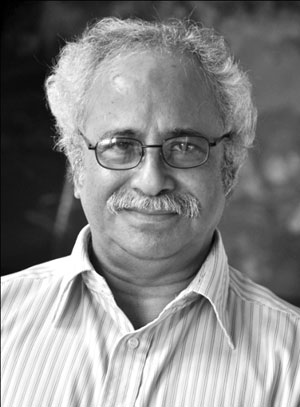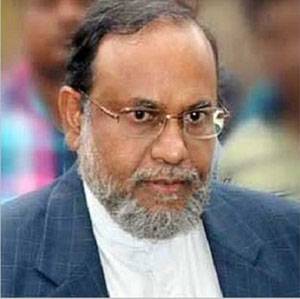 By this time the fate of war criminal Mir Quasem Ali is known to all as the Supreme Court on Tuesday delivered its verdict on his appeal against the death sentence awarded to him by the International Crimes Tribunal (ICT) for his crimes against humanity during the Bangladesh Liberation War (BLW). A five-member bench of the Appellate Division, headed by Chief Justice S K Sinha, announced the verdict. The other judges of the bench were Justice Syed Mahmud Hossain, Justice Hasan Foez Siddique, Justice Mirza Hussain Haider and Justice Bazlur Rahman. The verdict was given on the basis of evidence produced before the court to substantiate his crimes against humanity committed 45 years ago in Chittagong and the adjoining areas while collaborating with the Pakistani occupational forces.
By this time the fate of war criminal Mir Quasem Ali is known to all as the Supreme Court on Tuesday delivered its verdict on his appeal against the death sentence awarded to him by the International Crimes Tribunal (ICT) for his crimes against humanity during the Bangladesh Liberation War (BLW). A five-member bench of the Appellate Division, headed by Chief Justice S K Sinha, announced the verdict. The other judges of the bench were Justice Syed Mahmud Hossain, Justice Hasan Foez Siddique, Justice Mirza Hussain Haider and Justice Bazlur Rahman. The verdict was given on the basis of evidence produced before the court to substantiate his crimes against humanity committed 45 years ago in Chittagong and the adjoining areas while collaborating with the Pakistani occupational forces.However, before the announcement of the verdict some people including a pair of ministers tried to create a controversy on the role of Chief Justice (CJ) S K Sinha and the judiciary uttering some provocative words tantamount to contempt of court. They criticised the CJ and the judiciary after the former last week rebuked government prosecution for failing to produce adequate evidence in one account to substantiate the crimes against humanity committed by war criminals Mir Quashem Ali during BLW. Earlier in 2014 the ICT awarded death sentence to him in two accounts, out of 14 different charges. He was also sentenced to imprisonment up to 20 years in several other charges.
According to the witnesses at the ICT, he had operated a torture camp in Chittagong town in 1971 while collaborating with the Pakistani occupational forces. Several of the detainees of the torture camp on Dalim Hotel were killed and their bodies were thrown in the Karnaphuli River. As these crimes were proved, the ICT awarded him death penalty as it awarded the capital punishment to several others. Of them Jamaat-e-Islami (JeI) leaders Abdul Quader Mollah, Mohammad Kamaruzzaman and Ali Ahsan Mohammad Mujaheed and Bangladesh Nationalist Party (BNP) leader Salahuddin Quader Chowdhury have been hanged so far after the SC upheld the verdict of the ICT.
 The Food Minister Qamrul Islam and Liberation War Affairs Minister A K M Mozammel Haque suggested, while criticising the CJ, that the appellate bench of the SC should be reconstituted so that the death sentence awarded by the ICT to Mir Quashem Ali is upheld. They said so probably fearing that due to the 'lack of evidence' the death sentence of Mir Quashem Ali might be commuted. It is true that the people want the war criminals to get death sentence and be hanged until death. But before confirming a death sentence the court must have all the evidence beyond doubt about the crimes against humanity. Any slack in the process of testifying and a simple lack of evidence might give a benefit of doubt in favour of the accused. So the CJ advised the prosecution to produce flawless strong evidence for substantiating war crimes against any accused. The CJ did not mean it only in case of Mir Quashem Ali, but for every accused of war crimes.
The Food Minister Qamrul Islam and Liberation War Affairs Minister A K M Mozammel Haque suggested, while criticising the CJ, that the appellate bench of the SC should be reconstituted so that the death sentence awarded by the ICT to Mir Quashem Ali is upheld. They said so probably fearing that due to the 'lack of evidence' the death sentence of Mir Quashem Ali might be commuted. It is true that the people want the war criminals to get death sentence and be hanged until death. But before confirming a death sentence the court must have all the evidence beyond doubt about the crimes against humanity. Any slack in the process of testifying and a simple lack of evidence might give a benefit of doubt in favour of the accused. So the CJ advised the prosecution to produce flawless strong evidence for substantiating war crimes against any accused. The CJ did not mean it only in case of Mir Quashem Ali, but for every accused of war crimes.For lack of strong evidence the death sentence awarded by the ICT to a JeI leader, war criminal Delwar Hossain Sayedee was commuted to imprisonment until death. It does not mean that Sayedee was not a war criminal. But some lack of evidence at certain crucial point often makes the judges blind and even knowing the facts they have to act on the basis of evidence and even have to allow a hardcore criminal to escape death sentence. We must keep a point in mind that the trial in the ICT is not aimed at hanging all accused en masse with a quick trial but to bring the culprits like Pakistani collaborators to book for their crimes against humanity committed in course of assisting the Pakistan occupation army during the BLW in 1971.
The main purpose of the ICT is to convict the perpetrators of crimes against humanity that mainly include killing, raping, forcible conversion and eviction. It is the court which will decide who has to be hanged, who has to be imprisoned until death, or who is to be freed with low punishment. The ICT and the SC as independent courts are authorised and the people should accept all of its verdicts and decisions without any question. People in Bangladesh have their full confidence in the judges and the judiciary, especially in the High Court, the Supreme Court and their judges. It is the only organ of the state that still remains mostly free of corruption, immune to threat and free of interference from the government.
Despite the attacks on their lives and properties since the start of prosecution against the war criminals, the judges of the ICT continued prosecuting the war criminals without favour and fear. It is Justice Nizamul Hoque who resigned on his own when his Skype conversation with a friend abroad was leaked in late 2012. After the leak of the talks he resigned as Supreme Court Bar Association then headed by an anti-ICT lawyer demanded the resignation for the sake of the sanctity of the ICT. He resigned in the evening after the resignation had been demanded in the morning. Mind you, there is hardly an instance of resignation by officials in Bangladesh even in case of proven corruption! So the most judges and largely the judiciary still have the quality to have confidence of the people. Hence there should not be any harsh comment against the judges and judiciary by any quarter.
But insiders at the ruling party said the two ministers with their derogatory and inappropriate remarks hampered the image of the government and belittled the stature of the SC. Meanwhile being embarrassed with the remarks of the government of Prime Minister Sheikh Hasina said her government disowned their observations which were of their own. The over enthusiastic remarks of the duo have opened a fresh scope for the BNP to say that event the highest court of the country could not escape the venom of the 'autocratic government that retained power through a facade election boycotted by major parties.'
The government of Sheikh Hasina often has to tackle the over enthusiasts of her party. These enthusiasts include in all tiers from the ministers to students activists in the grassroots, where people often suffer at their hands whenever there is a national day celebration, or a day of commemoration like that of March 7. In those occasions they go berserk in the name of party, politics and the government. To make their events the ruling party activists extort people, block their movement and even create obstacle to the patients moving to the hospitals. Despite repeated warnings from the high-ups these party activists continue their muscle politics throughout the country.
A similar enthusiast expelled journalists from the Narajangaj court early this month during the start of trial against the criminals for killing seven people about two years ago. The enthusiast Public Prosecutor Wajed Ali Khokon on his whim drove out the reporters from the court attributing to a false order of the judge of the court. However the reporters were allowed to cover the trial from the following court session.
In the ruling party there are many over enthusiasts like the aforesaid ministers and the PP Khokan, who time and again resort to shameful events that embarrass even the Prime Minister. The ruling party must take the enthusiasts and the sycophants to task for the sake of perfect and strong administration, upholding people's confidence and support.
Nizam Ahmed is Business Editor,
The Daily Observer



